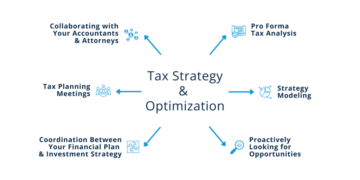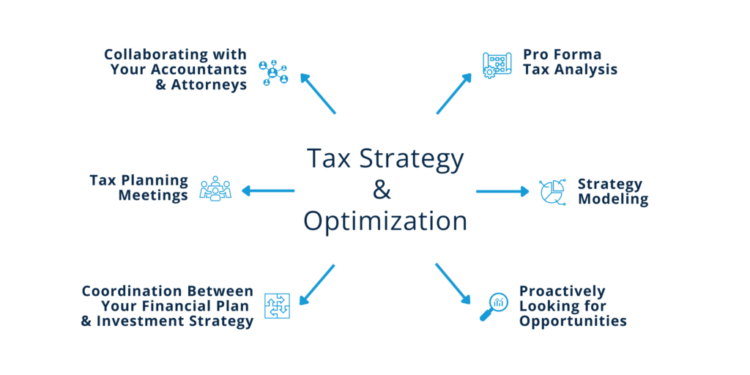Effective tax strategies play a critical role in shaping a successful wealth management plan. A thoughtful approach to taxes can help you save money, protect your assets, and ensure your wealth grows efficiently over time. Collaborating with a skilled wealth planner ensures that your financial goals align with the tax landscape, enabling you to make the most of available opportunities while staying compliant with regulations.
The Role of Tax Strategies in Wealth Management
Taxes are an unavoidable part of financial planning, but they don’t have to be a burden. By incorporating tax-efficient strategies into your wealth management plan, you can reduce the amount of tax you owe, preserve more of your income, and optimize your financial resources for long-term growth.
Here’s why tax strategies are essential in wealth management:
- Preservation of Wealth: Minimizing tax liabilities helps protect your wealth, allowing you to allocate more funds toward achieving your goals.
- Maximizing Investments: Tax-efficient investing ensures that more of your returns are reinvested, accelerating growth.
- Estate Planning Benefits: Strategic tax planning simplifies the transfer of wealth to future generations.
Key Tax Strategies in Wealth Management
1. Tax-Efficient Investments
A wealth planner focuses on investments that minimize tax exposure while delivering strong returns. For instance:
- Index Funds and ETFs: These are often more tax-efficient than actively managed funds due to lower turnover rates.
- Tax-Free Accounts: Utilizing accounts like tax-advantaged retirement funds or savings accounts can shield a portion of your wealth from taxation.
- Dividend Income: Choosing investments with favorable tax treatment on dividends can boost after-tax returns.
2. Utilizing Tax Deductions and Credits
Knowing which deductions and credits you qualify for can significantly lower your taxable income. Common examples include deductions for education, home loan interest, or healthcare expenses. A wealth planner ensures you’re taking advantage of all applicable deductions and credits.
3. Capital Gains Optimization
When managing your investments, it’s crucial to understand capital gains tax implications. Strategies to optimize include:
- Holding Period Management: Long-term investments are usually taxed at lower rates than short-term holdings.
- Tax-Loss Harvesting: Offsetting gains with losses in your portfolio to reduce tax liabilities.
- Strategic Asset Location: Placing investments in tax-advantaged accounts where appropriate.
4. Income Splitting and Family Tax Planning
High-net-worth individuals often benefit from income-splitting strategies, which involve distributing income among family members in lower tax brackets. This approach can be particularly useful in family-run businesses or for managing inheritance.
5. Estate and Legacy Planning
Tax considerations are a critical part of transferring wealth to the next generation. Without proper planning, a significant portion of your estate could be eroded by taxes. Tools like trusts, gifting, or charitable contributions can help reduce estate taxes while preserving your legacy.
The Role of a Wealth Planner in Tax Strategy
Tax laws can be complex and ever-changing, making it difficult to navigate on your own. A wealth planner plays a vital role in ensuring your wealth management plan incorporates the best tax strategies. They bring expertise in areas like:
- Identifying tax-saving opportunities specific to your financial situation.
- Aligning investment strategies with tax goals.
- Ensuring compliance with local and international tax regulations.
By working with a professional wealth planner, you gain peace of mind knowing that your financial plan is optimized not just for growth, but also for tax efficiency.
The Consequences of Ignoring Tax Strategies
Neglecting tax strategies in your wealth management plan can result in significant losses over time. Without proper planning, you may:
- Pay more taxes than necessary, reducing the funds available for investment or personal goals.
- Miss opportunities for deductions, credits, or deferrals.
- Face penalties for non-compliance with tax regulations.
To avoid these pitfalls, it’s essential to prioritize tax planning as part of your overall financial strategy.
Conclusion
Tax strategies are a cornerstone of effective wealth management. By minimizing liabilities, optimizing investments, and ensuring compliance, you can protect and grow your wealth over time. A qualified wealth planner can help you navigate the complexities of tax laws, ensuring that your financial plan remains efficient and aligned with your goals.
Incorporate tax efficiency into your wealth management plan today, and enjoy greater financial freedom tomorrow.
Ascenta Wealth offers more than just advice—we offer peace of mind. From investment strategies to retirement planning, we provide expert guidance to help you take control of your financial future with clarity and confidence.
- Ascenta Wealth
- Ascenta Wealth

























































